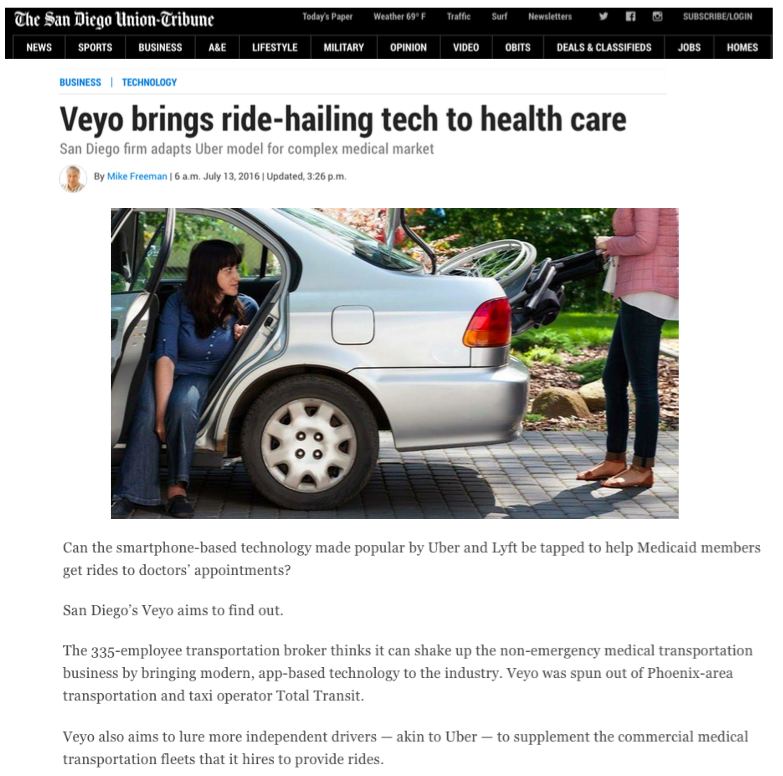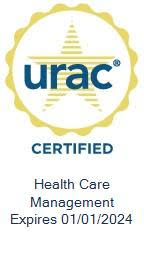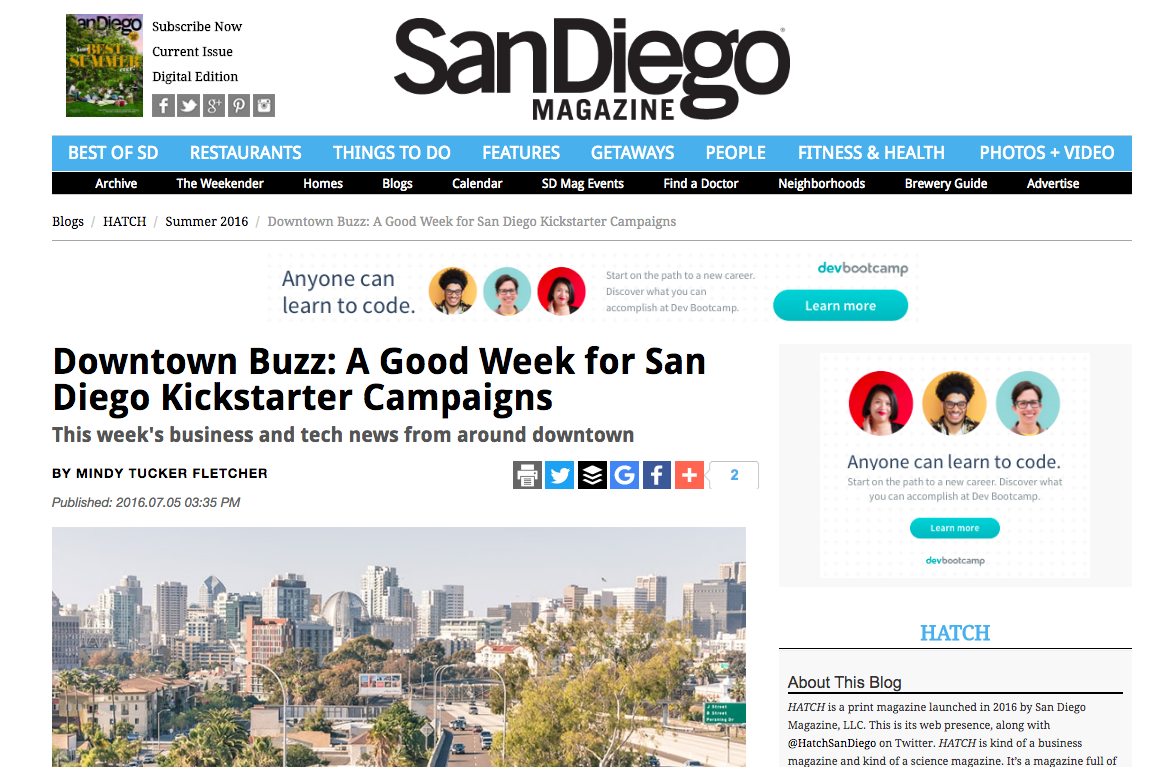Veyo Brings Ride-Hailing Tech to Health Care
July 15, 2016
Veyo Brings Ride-Hailing Tech to Health Care
San Diego firm adopts Uber model for complex medical market.
by Mike Freeman
Can the smartphone-based technology made popular by Uber and Lyft be tapped to help Medicaid members get rides to doctors’ appointments?
San Diego’s Veyo aims to find out.
The 335-employee transportation broker thinks it can shake up the non-emergency medical transportation business by bringing modern, app-based technology to the industry. Veyo was spun out of Phoenix-area transportation and taxi operator Total Transit.
Veyo also aims to lure more independent drivers — akin to Uber — to supplement the commercial medical transportation fleets that it hires to provide rides.
The goal: Make sure the right vehicles are in the right places at the right times, which often isn’t the case today. Federal agencies estimate that 3.6 million Americans miss their doctors’ appointments every year because of transportation problems.
“In our markets where we have independent driver providers, which is primarily urban areas right now, if somebody calls in with last-minute hospital discharge, our agent in the call center can have that trip matched to an independent driver and get that person picked up in 10 minutes,” said Josh Komenda, president of Veyo. “That is unheard of in the traditional industry.”
So far, the company has signed up about 2,000 independent drivers in the five states where it operates. They receive training in cardiopulmonary resuscitation, or CPR, as well as HIPPA confidentiality and Americans with Disabilities Act rules. All vehicles must be inspected, and drivers undergo background checks and drug tests.
Veyo shepherds independent drivers through these requirements, offering classes and providing other tools to get drivers trained.
Veyo isn’t alone in tapping technology. Dozens of other medical transportation brokers are turning to mobile software to improve their service.
One of the largest, St. Louis-based Medical Transportation Management, offers its drivers a mobile app that includes turn-by-turn directions, GPS and time-stamp data, passenger signature capture and expedited claims submission. MTM operates in 29 states, including California.
Veyo contends that it built its system from the ground up to tap real-time mobile device tracking and reporting technology, rather than bolting technology onto an existing way of doing business.
“Non-emergency medical transportation has been a frustrating benefit,” said Komenda. “It has a high grievance rate. But people really do understand how technology has changed transportation in the past five years — the real-time visibility and control, and the ability to share information over technology.”
Non-emergency medical transport is a roughly $5 billion industry tied to a Medicaid benefit that pays for rides to doctor’s appointments for about 70 million Medicaid members nationwide. In California, the state Medicaid program is called MediCal.
Transportation brokers help manage the benefit for states and managed care organizations. They operate call centers and hire a diverse group of transportation outfits to drive patients.
Uber and Lyft-style innovations have been slow to reach health care transit, said Steve Rebuck, general manager of Medstar Medical Transportation in Tempe, Ariz., which does about 500 trips per day mostly for wheelchair and bed-bound patients.
“No-shows are very expensive for us,” said Rebuck. “It is important for us to have the right information because it’s a low-margin, high-volume industry. When the information isn’t correct, it makes everything throughout the day get delayed.”
Rebuck said Veyo’s technology “is very good at making sure the information that gets disseminated down to us is correct. That is critical.”
Total Transit acquired Komenda’s previous start-up, GoFastCab, in 2013 for an undisclosed price. GoFastCab was an SMS text and iPhone ordering app for cab companies.
Total Transit fed GoFastCab’s technology into a multi-million dollar effort to build a mobile apps suite and logistics platform for non-emergency medical transportation. It launched as Veyo in 2015.
“We made a decision with Total Transit to spin off their non-emergency medical transportation division and customer base, and have it join the Veyo team,” said Komenda.
About 75 workers are based at the company’s San Diego headquarters. The bulk of Veyo’s employees work at a call center in Arizona. The company has contracts with about 30 managed care providers in Arizona, California and Texas. It also has contracts with state governments in Idaho and Colorado, which manage the Medicaid transportation benefit themselves.
Veyo arranges about 12,000 trips per day, said Komenda, and expects to achieve $100 million in annual revenue this year.
Rebuck of Medstar Medical doesn’t see the independent drivers as competition, in part because all Medstar vehicles are wheelchair and stretcher capable.
“It’s a natural evolution for the industry,” he said. “What Veyo is doing makes a ton of sense. There are people who want to do it, and they can work when they want to work.”
Read the full story on the San Diego Union-Tribune’s website here.




